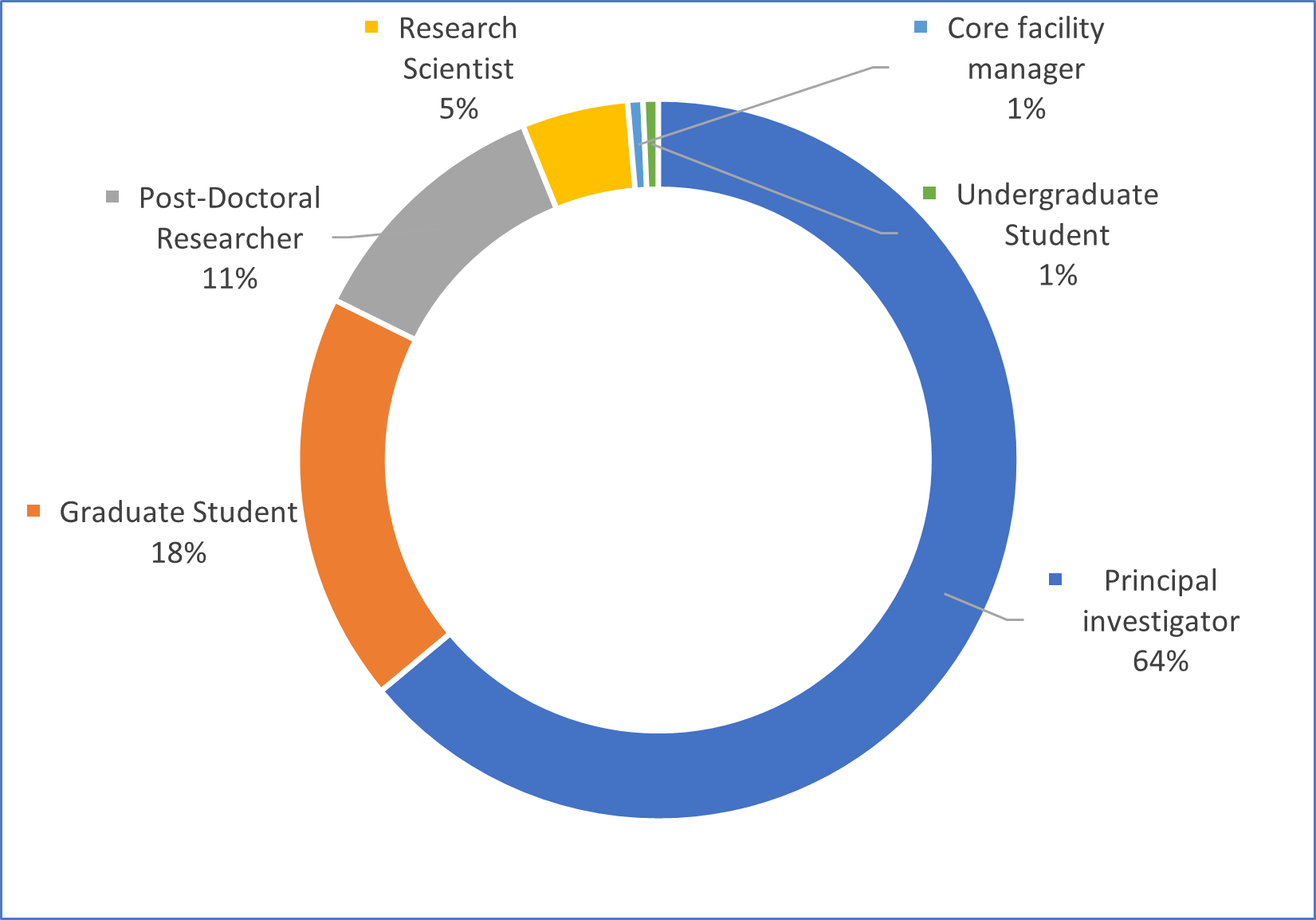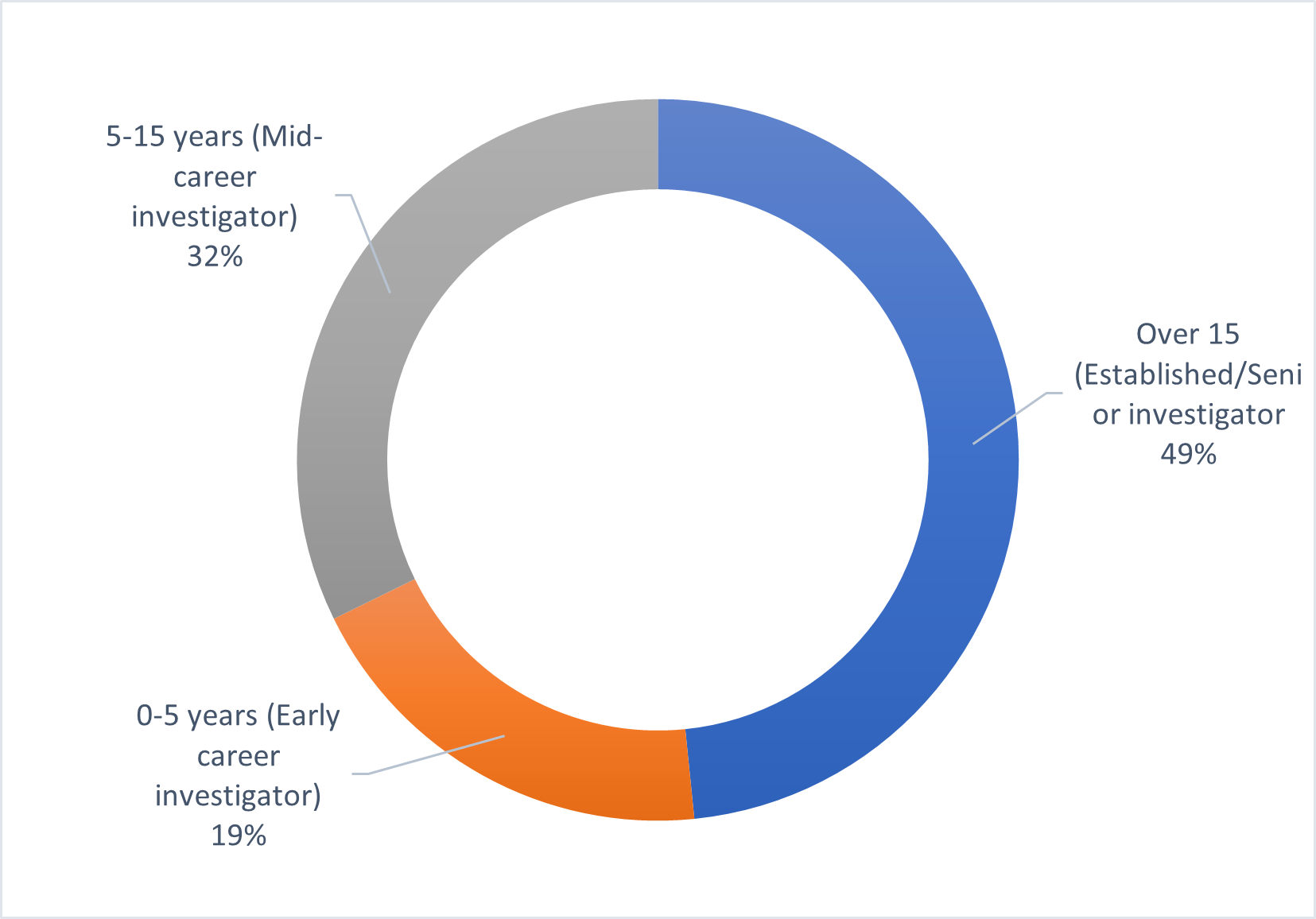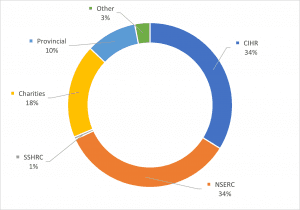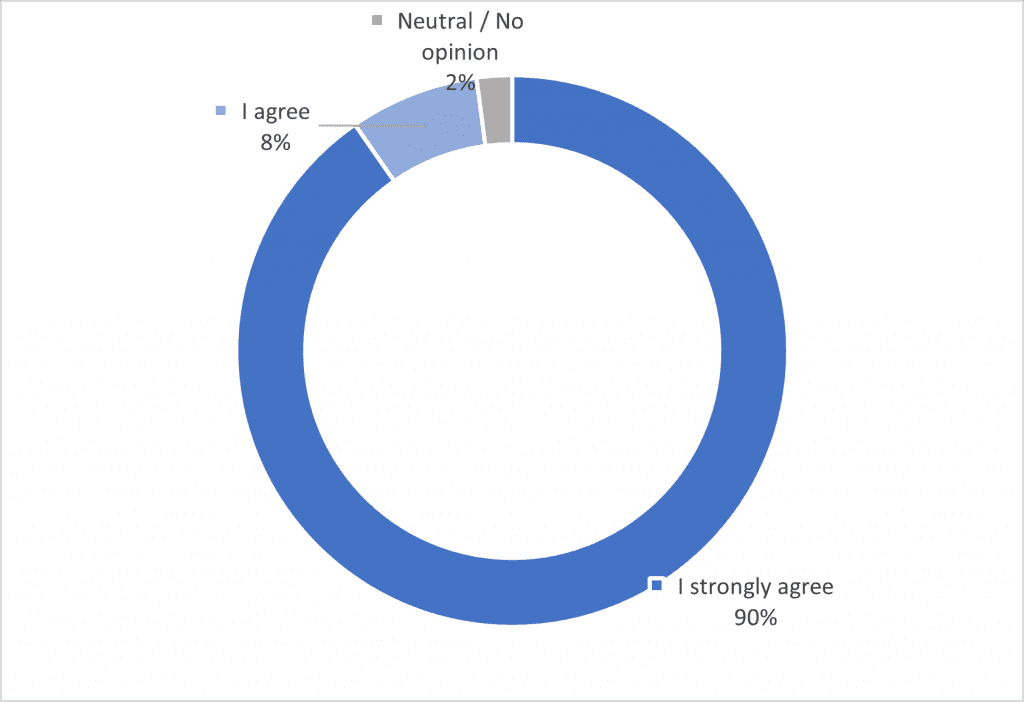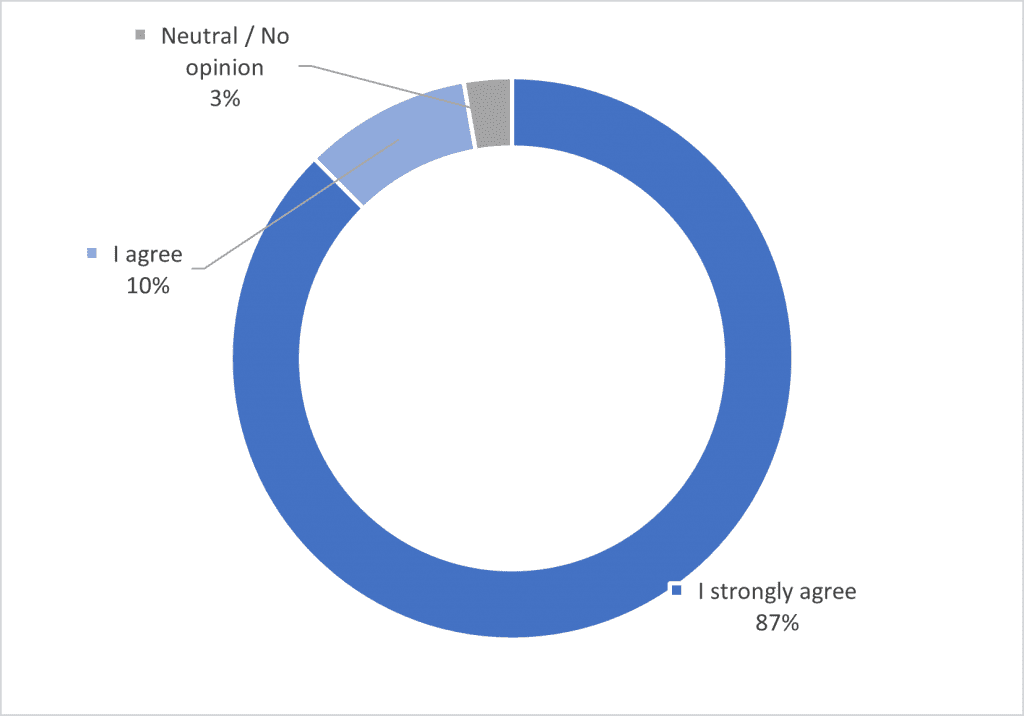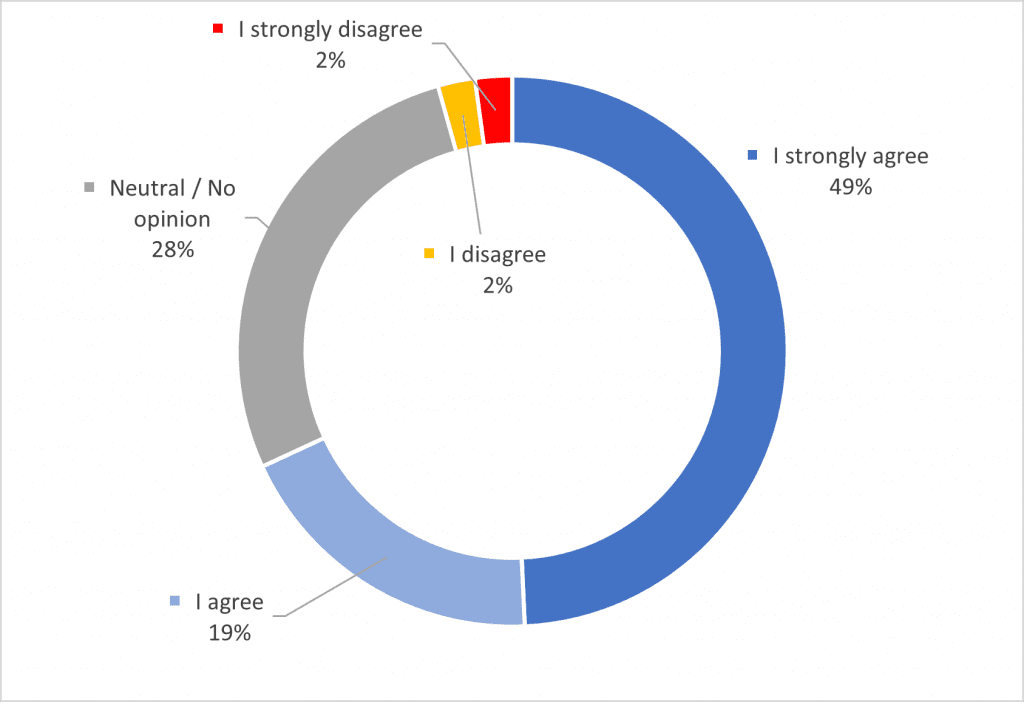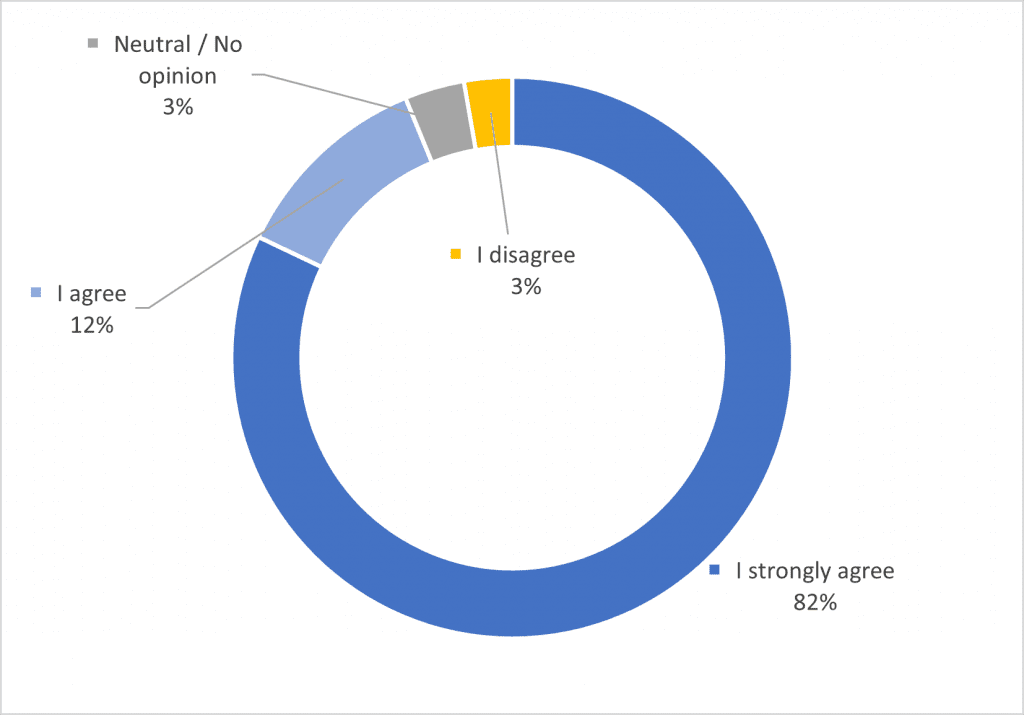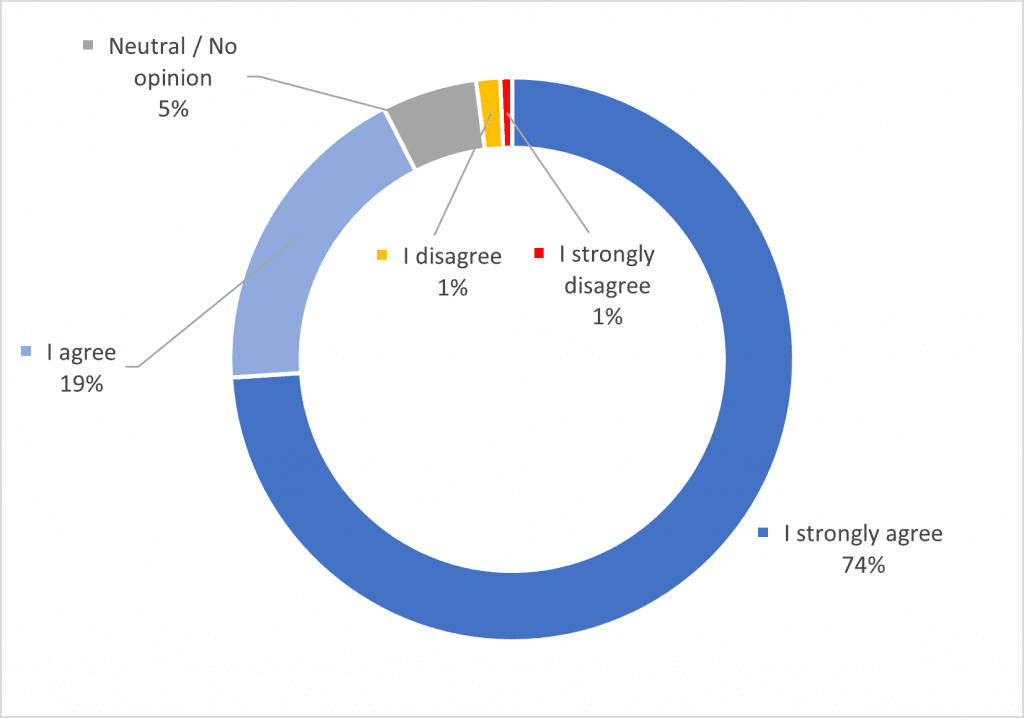The Canadian Association for Neuroscience advocates for better support for science in Canada and for increases in the budget of the three federal funding agencies, CIHR, NSERC and SSHRC.
We conducted a survey of our members August 23 to September 6, 2022 to get their opinion on our advocacy objectives and targets for the coming months and years.
The survey was sent by email to our membership and on our website. We received 147 responses. The results are presented below.
Who responded
95% of respondents were CAN members, and the majority of those who responded where Principal Investigators.
Other questions for Principal Investigators
What are your major funding sources (indicate all that apply)?
If you receive funding from CIHR, NSERC or SSHRC, please estimate the percentage of this funding is used to pay for salaries for your students, post-docs and staff?
On average, Principal investigators reported that 59% of tri-agency funds were used to pay salaries (average= 59%, median=65%)
What should CAN advocate for?
CIHR funding
In the past years, CAN has advocated for a 25% increase to the budget of CIHR to meet the targets outlined in the Fundamental Science Review (Naylor report) and to compensate for the setback of the COVID-19 pandemic to research laboratories in Canada.
The Canadian Association for Neuroscience should advocate for increased funding by the federal government for the Canadian Institutes of Health Research (CIHR)
CAN should advocate for a CIHR budget increase of (%)
- Average: 37%
- Median: 25%
CIHR’s budget should be indexed to inflation
- 99% responded Yes.
NSERC funding
In the past years, CAN has advocated for a 25% increase to the budget of NSERC to meet the targets outlined in the Fundamental Science Review (Naylor report) and to compensate for the setback of the COVID-19 pandemic to research laboratories in Canada.
The Canadian Association for Neuroscience should advocate for increased funding by the federal government for the Natural Sciences and Engineering Research Council (NSERC)
CAN should advocate for a NSERC budget increase of (%)
- Average: 38%
- Median: 25%
NSERC’s budget should be indexed to inflation
- 99% responded Yes.
SSHRC funding
In the past years, CAN has advocated for a 25% increase to the budget of SSHRC to meet the targets outlined in the Fundamental Science Review (Naylor report) and to compensate for the setback of the COVID-19 pandemic to research laboratories in Canada.
The Canadian Association for Neuroscience should advocate for increased funding by the federal government for the Social Sciences and Humanities Research Council
CAN should advocate for a SSHRC budget increase of (%)
- Average: 29%
- Median: 25%
SSHRC’s budget should be indexed to inflation
- 96% responded Yes.
Graduate Student and Post-doctoral fellow support
The Canadian Association for Neuroscience should advocate to increase the number and value of graduate student stipends funded by the federal government
CAN should advocate for a student stipend budget increase of (%)
- Average: 51%
- Median: 50%
Graduate student stipends should be indexed to inflation
- 98% responded Yes.
Brain and neuroscience targeted research funding
A number of initiatives have been proposed in Canada to specifically support neuroscience research, in addition to tri-agency supported initiatives. This question is related to these independent initiatives.
The Canadian Association for Neuroscience should advocate for increased targeted funding for brain and neuroscience research in Canada
I would be interested in participating in CAN advocacy events, such as Parliament Hill Day and other meetings with Members of Parliament.
62% of respondents would be interested in participating in CAN advocacy events, demonstrating a high level of engagement.
Funding section – Additional comments
Cost of living vs. student stipends
- Cost of living is skyrocketing and in Vancouver rental prices are insane. We need to do more
- Student stipends are paid for by departmental teaching assistantships and/or CG/OG scholarships. If/when I get a greater funding package (CIHR), I’ll supplement/replace the Teaching Assistantships
- Student stipends will likely need to increase in the future given that post-doc and grad student salaries are woefully low, especially in metro areas like Toronto.
NSERC operating grant – limited funds
- I have largely been limited to NSERC funding (read – low funding) so cannot afford much more than 1-2 graduate students who make up the balance of their stipend by working as Teaching Assistants or getting what is typically a one semester fellowship.
- My NSERC grant is 26,000 per annum. this is not enough to pay 1 student salary. Without the intermittent, short term charitable grants I would not be able to conduct research that trains students.
- NSERC funds are only enough to pay for animals, not provide students with stipends
- all students are paid from teaching assistantships
- 26000$/an NSERC = Programmation de recherche avec financement insuffisant pour offrir un salaire décent et complet pour un étudiant PhD et le matériel nécessaire pour les activités de recherche.
Additional expenses covered by grants
- I run a neurophysiology lab, and our university requires that we have a full time veterinary technician on staff.
Proportion of operating grant used to pay salaries is increasing
- Our institution has forced investigators to increase the stipends paid to students to compensate for increased cost of living and higher stipends. Although this is commendable, it has radically increased the fraction of our grants directed to salaries. This means lower funds for operating costs and ultimately will lower the number of positions available to trainees and reduced competitiveness of canadian labs. Institutions need to pressure tricouncils to increase funding for operating grants. not simply increase levels and numbers of studentships and fellowships, as this is only a small percentage of the trainee salaries.
- Currently, two of my post-doc are supported by their own fellowship. If they did not get them, the % of my grant used to pay salaries would be 70%.
Lack of support from CIHR-NSERC-SSHRC
- I am currently NOT awarded any grant from the Tri-Agencies
- “I have been supported for spinal cord injury research in the past by CIHR. However, for the past 10 years or so, virtually nothing from CIHR. Currently, I receive funding from US and European granting agencies and from philanthropic donations I have solicited with the assistance of my hospital foundation. CIHR has ceased to exist for me! ONF another source of funding was killed this year by the Ford Government of Ontario, ONF formerly funded my research. Other Canadian charities have stopped funding spinal cord injury research.”
Comments on student stipends
- As an NSERC PGSD holder who also receives additional funding I cannot imagine a student being in the position of relying solely on a PGSD award for PhD funding, particularly considering that doctoral degrees almost always run longer than the duration of the award and that the fixed value of the award leaves students particularly vulnerable to inflation risk. Even with additional funding sources my current compensation falls somewhere between 25% and 33% of that earned in industry by other students from my previous (computational) degrees who are doing similar work.
- I am the recipient of a CIHR Canada Graduate Scholarship (amount received is $17,500). This amount of money, in addition to the amount I get as a research assistant, would not be enough money to pay for my expenses and to live comfortably if I lived on my own. Thankfully, I live with my parents. If I didn’t, I would need a part-time job to further support myself, which would take time away from my research and master’s program studies. I think more government funding is absolutely necessary to support graduate researchers.
- increasing the number of grad student awards is good; increasing the amount (above $35K) is not. This is already above the average student stipends. Funding more students is far better than funding the same number of students at a higher amount.
- I am very reluctant to advocate for higher trainee stipends if operating grants can’t ensure the same sort of increases to those without external awards; in that respect, I really think increases in operating grants need to come first since this is how most trainees are paid, and would allow all salaries to increase equally rather than exacerbating existing disparities. Further to this point, I worry about the level of solidarity and coordination across groups, whether its certain groups asking for bigger studentships or other groups asking for targeted funding. The Naylor Report may seem like ancient history but I still think it applies and should be used to guide our advocacy efforts. The issue is how to re-package it. I, for one, think of every lab as a small business, and gov’t should want to support small businesses especially those that train/employ the brightest young Canadians. Maybe this is language they could understand.
- Better to advocate for general open funds. Otherwise will go to other brain initiatives that IMO are not as open. But also government apparently can’t just give to one of tri-agencies. So.. kind of moot to bring apart
- postdoc and graduate stipends should increase with each year of training/employment.The NIH scale for postdoc salary is a better model than Canada’s
- Graduate students in all fields receive stipends below the poverty line in all major institutes across Canada. Of course the federal gov’t has an obligation to provide adequate funding for research (via the tri-agency system) but focusing exclusively on governmental funding is dodging a major part of the problem, namely the institutions that are actively exploiting their ‘student’ workforce. I strongly believe that scientific advocates should lobby for policy that guarantees take-home pay for graduate students to be at least in line with local living wages (which are often determined by researchers at these very institutions!). Any scientist will tell you that graduate ‘students’ are treated and expected to behave much more like employees than students, but institutes and individual PIs are not required to abide by typical labour laws because of this misnomer. The system is fundamentally broken and the abuse and exploitation that thrive under the system are forcing amazing people out of research and causing intense harm. I appreciate all the work you are doing to advocate for us but I believe much more radical action is needed!
- I fully support these initiatives, especially re. trainee salaries. But if student stipends increase and grant sizes don’t, then it will lead to inequities between students and/or fewer students/postdocs getting positions.
- For trainee stipends, there are multiple aspects to consider. Tri-council scholarships need to be increased to be above the poverty line and indexed to inflation, but it should be recognized that these are tax free awards. But any stipend supported through the tri-councils should also be increased and indexed in a similar way; these are simply far too low.
- The stipends for postdoctoral fellows and graduate students should be constantly monitored and indexed to inflation
- Please note that I selected disagree to the student stipend question because I do not agree that more stipends should be available. However, I strongly agree that the value of those available should be greatly increased. I’m not sure if others had a mixed reaction to this question. Thank you for putting this survey together.
- I repeat, my opinion is that increased value and number of studentships and fellowships is only a small part of what is needed and will not by itself solve the problem. This needs to be made crystal clear.
- We need better funding support for graduate and postdoctoral researchers – fund more people and provide greater funding to support cost of living. Most postdocs are offered somewhere between 40 and 60K per year, which isn’t even livable in a city like Vancouver, Montreal or Toronto, and is obscene in the context of a decade or more of education to get to that position.
- At present, the best students are discouraged from pursuing a career in science as they see too much work and too little reward. We already see the rankings of Canadian universities falling in the world rankings as Canada spends less and less on Advanced education. Soon we will fall even further behind.
- With regard to the student funding question, I think it’s very important to advocate for increased stipend levels for students. However, I’m neutral on advocating for more fellowships. More students is not what we necessarily need, as much as treating students better.
- I think we should cancel Vanier and Banting fellowships and put the money into the general CGS and postdoctoral fellowships. I understand we want to promote outstanding trainees but I think it is better to foster more trainees than reward a handful of good ones (that might not turn out to be good anyways)
Additional comments
- I realize that asking for CIHR and NSERC to double their budget may seem absurd, but we have to look at what the NIH has done. Doubling the budget over a reasonable time frame is exactly the type message that needs to be sent to show that Canada is serious about science.
- As researchers we need to constantly innovate our approach to stay relevant in the field and receive funding. Yet, after our startup funds and CFI/ORF grants are used, where do the funds come from to buy new infrastructure to innovate? How do we recruit talented graduate students and postdocs when the salaries we pay them (that are based upon fellowship values) are less than what they could earn as an Uber driver? For these reasons we need to increase the budget for grants.
- Many of the costs of research (particularly conferences) have gone up considerably more than the overall inflation rate (e.g., hotel room costs seem to have doubled in the past 5 years though inflation is nominally 5-10%).
- There is not enough money to go around at every level of academic science in Canada!
- Living the west coast these advocacy events are undoubtedly important but not practical for us to attend — travel is expensive, funds are limited!
- tyty for doing this work!
- Really appreciated the petition sent around regarding stipends and research funding
- I live in Alberta so it is not feasible for me to participate in an Ottawa event
- Happy to help with letters, calls, meetings as you see fit.
- Happy to help this important effort. Thank you for your hard work!

